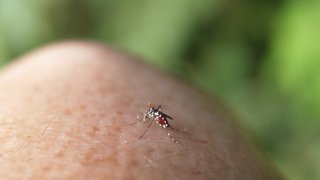
The Connecticut Agricultural Experiment Station has identified the eastern equine encephalitis (EEE) virus in mosquitoes at Pachaug State Forest in Voluntown for the first time this season.
Because of this, the state Department of Public Health is advising residents in southeastern Connecticut to protect themselves and their children from mosquitoes to reduce the risk of exposure to the virus.
The Connecticut Agricultural Experiment Station (CAES) traps mosquitoes and monitors them for mosquito-borne diseases, such as eastern equine encephalitis and West Nile virus.
Officials tested mosquitoes in the state forest on Sept. 23 and later determined that they were EEE positive. These are the first positive cases of EEE in Connecticut this year, officials said.
Get Connecticut local news, weather forecasts and entertainment stories to your inbox. Sign up for NBC Connecticut newsletters.
DPH officials said the mosquitoes were Culiseta Melanura, which is a predominately bird-biting species and Ochlerotatus Canadensis, which is a mammal-biting species.
"We encourage residents of southeastern Connecticut to take simple measures such as wearing mosquito repellent and covering bare skin, especially during dusk and dawn when mosquitoes are most active," said DPH Commissioner Manisha Juthani, MD. “While the detection of EEE virus is of concern, it is important to remember that we do not expect to see a lot of mosquito activity in the month of October.”
EEE is a disease that can cause neurological disease and an infection of the brain, according to the Centers For Disease Control and Prevention. It can be fatal.
Precautions to Avoid Mosquito Bites
- Be sure door and window screens are tight fitting and in good repair.
- While outdoors for long periods of time, wear shoes, socks, long pants, and long-sleeved shirts. Clothing should be light colored and made of tightly woven materials that keep mosquitoes away from the skin.
- Use mosquito netting when sleeping outdoors and to protect small babies when outdoors.
- Consider the use of mosquito repellents recommended by the Centers for Disease Control and Prevention (CDC), such as ones containing DEET, picaridin, oil of lemon eucalyptus, IR3535, or 2-undecanone, and apply according to directions, when it is necessary to be outdoors.
- When using DEET, use the lowest concentration effective for the time spent outdoors (for example, 6% lasts approximately 2 hours and 20% for 4 hours) and wash treated skin when returning indoors. Do not apply under clothing, to wounds or irritated skin, the hands of children, or to infants less than 2 months.
- Minimize time spent outdoors between dusk and dawn when mosquitoes are most active.
Measures to Reduce Mosquitoes Around the Home
- Dispose of water-holding containers, such as ceramic pots, used tires, and tire swings, clogged gutters.
- Drill holes in the bottom of containers such as those used for recycling.
- Change water in bird baths on a weekly basis.
- Clean and chlorinate swimming pools, and cover pools when not in use.
- Use landscaping to eliminate areas where water can collect on your property.

